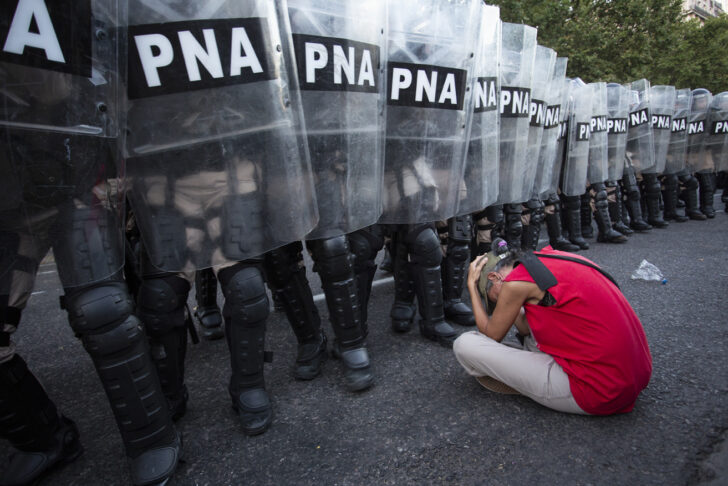Protesting in Argentina today involves numerous risks. Protesters receive insults and threats from the highest political authorities and their followers on social media. To reach the designated protest site, they must navigate roads blocked by security forces to prevent the movement of demonstrators. On the streets or public transport, individuals may be subject to delays and illegal searches by police looking for flags and other signs of political affiliation, something not seen since the military dictatorship. During protests, there are serious risks of being hit, pushed, chased by police on foot or motorcycles, sprayed with irritating chemical gases, or suffering burns. Additionally, protesters may be struck by rubber bullets in the body or face, potentially losing their sight. Protesters are also under constant scrutiny by police forces that have normalized the illegal practice of filming demonstrators for identification purposes. There is a risk of being detained simply for being present, whether protesting, working, or just passing by. Once detained, individuals may spend hours without knowing where they will be taken, and days before judicial authorities acknowledge the lack of evidence justifying their detention. Even then, they may be charged with crimes ranging from resisting authority to illegal association and public intimidation. Meanwhile, in the press and on social media, authorities continue their insults and accuse protesters of “terrorism.”
Marking the first six months into President Javier Milei’s administration in Argentina, we have prepared this report analyzing the various policies and strategies of the national government to discourage, obstruct, and harass those who try to exercise their right to protest in the streets. This perspective of treating protest as a crime enables the irrational use of force, arbitrary detentions, and the weakening or suppression of constitutional guarantees.

Since December 2023, the indiscriminate and illegal use of “less-lethal” weapons has also become a permanent feature of police actions during public demonstrations. Instead of using these weapons as a means of self-defense or to protect third parties, the police use them offensively, deploying tear gas and firing rubber bullets as a method to clear protesters. The result is a large number of injured people at demonstrations over the past six months. According to various organizations monitoring protests, at least 665 people were injured to varying degrees in six repressive episodes in the City of Buenos Aires in January, February, March, April, and June 2024. Some of them suffered severe eye injuries and vision loss due to rubber bullets fired by security forces at the faces of protesters. Irritant gases are also used irregularly and violently, sprayed at close range to the faces and bodies of protesters and bystanders alike, causing unprecedented severe chemical burns.
Like the use of such weapons, detentions during protests have a single goal: to instill fear and demobilize. Nearly all of these detentions are arbitrary. Prosecutors then use unverifiable information given to them by the police to build conspiratorial hypotheses, such as detainees belonging to political organizations exercising premeditated violence to destabilize the government. They seek to frame the actions of protesters as serious crimes, like illicit association or sedition. The other side of arbitrary detentions, imprisonment, and exaggerated criminal charges is the lack of judicial investigations into police violence. Pre-protest searches on public transport, sanctions against participants in social programs who mobilize, and fines on social organizations that protest are other measures aimed at social demobilization.
Since La Libertad Avanza took office, protesting in Argentina has been a crime. While this perspective is not new—Indigenous communities, unions, and environmental assemblies have experienced it before in provinces like Jujuy, Chubut, and Río Negro—it has now become a federal policy of the national government. As we highlight and denounce the repression and criminalization shrinking the civic space in our country, we know that only people taking to the streets will prevent this state of affairs from becoming normalized.
Photo: Susi Maresca

